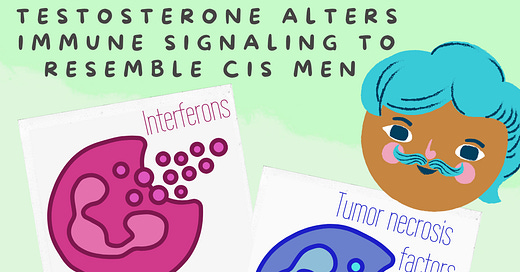Nature: Masculinizing testosterone therapy affirms more than meets the eye
gender affirming testosterone alters immune system function
A groundbreaking study published last month in Nature sheds light on just how much of the body’s physiology changes with gender affirming hormone therapy, shaking up the field of immunology in the process. The study by Lakshmikanth, et al. systematically examined changes in blood-circulating immune cells in 23 transmasculine people as they began taking gender affirming testosterone. After only one year, their immune cells more closely resembled those of cis men than of cis women.
Illustrated by the COVID-19 pandemic, men die from infectious disease more often than women. Immunologists have long assumed that this was due to chromosomal sex because (cis) men have weaker immune responses than (cis) women. To test this, the research team sampled the blood of 23 transmascs as they began gender affirming testosterone, including a baseline sample before starting T. This design allows them to track changes during the first year on HRT.
Using a variety of molecular analyses of the blood samples, the authors conclude that testosterone regulates the balance between two families of immune signals: the interferons and the tumor necrosis factors (TNFs). Interferons and TNFs are cytokines, which immune cells use to orchestrate responses to threats
(like injury or the presence of a pathogen).
Interferon-1 signaling is critical for mounting an immune response against pathogens - like a virus or bacteria. During masculinizing HRT, these molecules decrease in prevalence. At the same time, TNF signaling increases. TNF is a generic response to inflammation (either from a pathogen or an injury). These experiments establish a direct link between immune system function and circulating sex hormones.
To apply these findings to cis people, the researchers then analyzed the blood of cis men and cis women after COVID-19 infection. These experiments demonstrate that men have higher levels of TNF signaling than women. However, women had more active Interferon-1 signaling than men. Together, these data clearly suggest that transmasc HRT patients see an affirming physiological impact not only in secondary sex characteristics but also at the level of the immune system!
This study focussed on transmasculine people, and the inverse experiment (studying the effects of feminizing hormones on immune signaling) has not been performed. Regardless, these data clearly challenge the long-held assumption that sex chromosome composition is responsible for different immune responses between cis men and cis women.
However, you may not necessarily be surprised by this result. For those of us on HRT, so much of our bodies change in a short amount of time. Why would our immune systems be, ahem, immune from this trend?
Indeed, an emergent theme of QSL is confronting the insistence that sex assigned at birth is determinative for someone’s physiology. I’ve even argued as much in The Journal of Physiology. Years of research has merely assumed that gendered biologies are hard wired in chromosomes. But nothing could be further from the truth. Emerging evidence aligns with queer and trans experiences, suggesting that our bodies function as fluid systems which adapt with us throughout life.
For more on why chromosomal sex is not determinative:
Doctors aren't trained in queer health. But you can help!
If you are a queer person, you probably have had at least one bad experience with the medical system. Maybe a doctor asked you invasive questions about your sexuality or sexual practices. Or, they misgendered you (even after you shared your pronouns). Perhaps they didn’t know what you were talking about when you asked a…











First off, I'm a little worried now that I'm gonna DIE from an infectious disease like covid, but it's also somehow validating that my immune system recognizes who I am. I'm so glad you shared this study! Truly fascinating stuff. I wish there was more funding for research like this to help understand how our trans bodies change and adapt throughout our transitions and as we age.
So many things have changed...stuff I'd not heard of until it did and I started researching what was happening. 6 years now on hrt.
Not as much as I want. I got more unexpected changes than I thought, and less expected changes than I hoped. But, I started late. Alas.
Still, it is wholly wonderful :) Thank you, science! :P